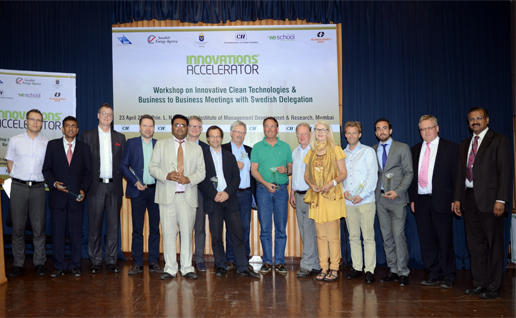Companies have to be born global
Welingkar School of Management hosts interactive discussions to demonstrate the value of the TRIPLE HELIX model of business development.
The discussion forum held at WeSchool, Mumbai, moderated by Srikant Illuri from Business Sweden was an opportunity for open discussions about the needs of modern businesses. Mr Illuri set the stage at the outset, ‘we live in a fast paced, ever-changing global economy. Companies have to hit the ground global, without the luxury of time that their predecessors might have enjoyed.’ Great ideas need to be combined with innovative deployment solutions. Technology will be the cornerstone of development, growth and sustainable solutions.
On April 23rd, The India Sweden Innovations Accelerator programme, together with the Welingkar School of Management, Mumbai, spent the day in out of the box discussions that talked about the need for new ways of thinking, for the future of energy development and international partnerships. In addition to a number of B2B meetings, the open discussions focused on the way in which partnerships are best fostered. Price point, interest and technical understanding of country partners, and costs of production were points raised by Indian and Swedish companies.
The TRIPLE HELIX Model was introduced by Mälardalen University, Sweden, as a core component of developing Sweden’s innovation systems. Joining the forces of academia, with business and government provides for stronger communication and knowledge flows, which in turn lead to more effective and relevant solutions.
Perhaps Robert Sundqvist from S-Solar put it best ‘If you were to ask people in 1901 what they wanted to make their lives easier, they would have said faster horses. It took Henry Ford to see that it was horsepower that would change lives.’ Innovation has to help society leapfrog. Energy innovation has to help us do this effectively and sustainably.
WeSchool have teamed up with the India Sweden Innovations Accelerator (ISIA) to create Industrial driven research partnerships. Each of the ISIA companies is now working with a team of three students. The teams will work, in friendly competition, to provide India relevant business strategies. Ludvig Lindström from the Swedish Energy Agency reconfirmed this, ‘we are lucky to have WeSchool as project Associates. Their students will work with the ISIA companies to provide best fits for the Indian market. Forward looking partnerships like this only make the programme stronger.’ The winning team will be hosted in Sweden and have the chance to intern with their research company.